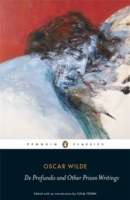De Profundis and Other Prison Writings
The Soul of Man Under Socialism; The Decay of Lying; De Profundis

Editorial Penguin UK
Fecha de edición mayo 2012
Idioma inglés
Prologuista Pearson, Hesketh
EAN 9780140439908
Libro
encuadernado en tapa blanda
Resumen del libro
"De Profundis and Other Prison Writings" is a new selection of Oscar Wilde's prison letters and poetry in "Penguin Classics", edited and introduced by Colm Toibin. At the start of 1895, Oscar Wilde was the toast of London, widely feted for his most recent stage success, "An Ideal Husband". But by May of the same year, Wilde was in Reading prison sentenced to hard labour.
"De Profundis" is an epistolic account of Oscar Wilde's spiritual journey while in prison, and describes his new, shocking conviction that 'the supreme vice is shallowness'. This edition also includes further letters to his wife, his friends, the Home Secretary, newspaper editors and his lover Lord Alfred Douglas - Bosie - himself, as well as "The Ballad of Reading Gaol", the heart-rending poem about a man sentenced to hang for the murder of the woman he loved. This Penguin edition is based on the definitive "Complete Letters", edited by Wilde's grandson Merlin Holland.
Colm Toibin's introduction explores Wilde's duality in love, politics and literature. This edition also includes notes on the text and suggested further reading. Oscar Wilde was born in Dublin.
His three volumes of short fiction, "The Happy Prince", "Lord Arthur Savile's Crime" and "A House of Pomegranates", together with his only novel, "The Picture of Dorian Gray", won him a reputation as a writer with an original talent, a reputation enhanced by the phenomenal success of his society comedies - "Lady Windermere's Fan", "A Woman of No Importance", "An Ideal Husband" and "The Importance of Being Earnest".
Colm Toibin is the author of five novels, including "The Blackwater Lightship" and "The Master", and a collection of stories, "Mothers and Sons". His essay collection "Love in a Dark Time: Gay Lives" from Wilde to Almodovar appeared in 2002.
Biografía del autor
Novelista, poeta, crítico literario y autor teatral de origen irlandés, gran exponente del esteticismo, Oscar Wilde conoció el éxito desde sus comienzos gracias al ingenio punzante y epigramático que derrochó en sus obras, dedicadas casi siempre a fustigar a sus contemporáneos. Defensor del arte por el arte, sus relatos repletos de diálogos vivos y cargados de ironía provocaron feroces críticas de los sectores conservadores, que se acentuaron cuando Wilde fue acusado y condenado por su homosexualidad, lo que originó el declive de su carrera literaria y de su vida personal. Entre sus obras destacan las cuatro comedias teatrales El abanico de lady Windermere (1892), Una mujer sin importancia (1893), Un marido ideal (1895) y La importancia de llamarse Ernesto (1895), El fantasma de Canterville o El retrato de Dorian Gray, su única novela.








